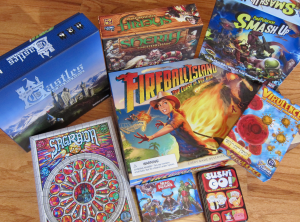
The process of finding and selecting new games, either for gameschooling or simple enjoyment, can be time-consuming and daunting. Board games are relatively expensive, with simple card games starting around $10, and complex board games with high-quality miniatures and other expensive components sometimes topping $100. If you’re going to invest that kind of money, you need to do some research first. Here are some resources we use when evaluating games to add to our collection.
- Board Game Geek is the premier web site for board gamers. For the last 2 decades, it has maintained a database of board games, with ratings, forums, links to reviews, file shares, and other resources. Whenever I want to research a new game, the first thing I do is check out its rating and reviews on BGG.
- Read the rulebook online. It’s becoming very common for publishers to make their game rulebooks available online as PDFs, particularly as this allows them to republish with rules changes and errata. Download the rules for a game you’re considering for purchase to get a feel for how the game works and for the quality of the instructions and artwork.
- Check out online review and playthrough videos. There are many board game reviewers who have YouTube channels, podcasts, blogs, etc. Your best best is to watch/listen to a variety of these and get a feel for who shares your tastes and has a presentation style that you enjoy. Some of my family’s favorites are:
- The Dice Tower website and YouTube channel.
- Tantrum House
- No Pun Included
- Shut Up & Sit Down
But how do you find out about new games in the first place?
- Social media. Join some board gaming Facebook groups and see what folks are buzzing about. For example, The Dice Tower has a very active 10,000+ member Facebook group. There are also Facebook groups specifically for gameschooling, such as Gameschooling (Homeschooling with Games) and the My Little Poppies Gameschool Group. These groups are a terrific resource for recommendations and reviews. Also, if you like a particular game, add the publisher on Facebook, Instagram, etc to get updates on their expansions and new offerings.
- Gaming conventions. Board game conventions are a great way to meet other board gamers and try out new games (both new to you, and brand new and being demonstrated by the publishers). Often these welcome families with kids as well; just be aware of any suggested age limits (probably 6-7+).
- Kickstarter. Keep an eye on the board games offered on Kickstarter. Even established publishers such as CMON and Stonemaier offer Kickstarters of their new games. Getting in on a Kickstarter means receiving a game before it hits the game stores, possibly having input into the game design and components, and sometimes getting Kickstarter exclusives that will never be available at retail, such as detailed plastic miniatures that replace generic meeples and other game pieces.
- Game stores. Your local game store is a great resource for learning about new games. Stop in at least once a month to see what’s new on the shelves and to get advice about games you might enjoy (“if you like Sagrada, you’ll probably like Tsuro”). Game stores will often have open copies of games that you can examine and play through before buying, and usually have open game nights when you can meet and play with other gamers. Supporting your local game store may cost a few more dollars than buying from Amazon, but it’s well worth it to keep them around!
- Subscribe to reviewer podcasts, YouTube channels, etc. If you listen to/watch review shows regularly, you’ll get frequent updates on the newest titles as they become available.
Finding and Choosing New Games
